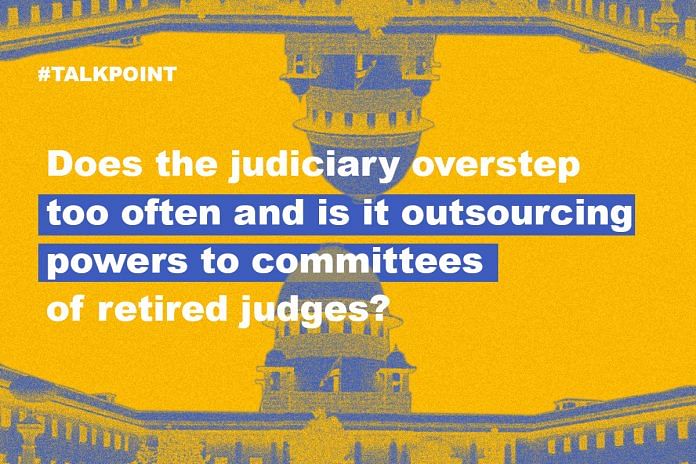Three significant comments made this weekend reignited the debate about separation between the judiciary and the executive.
President Ram Nath Kovind cautioned that the judiciary, the executive, and the legislature “need to be careful not to cross into each other’s finely-defined spaces. Or give the opportunity to read transgressions even when none is intended“.
Prime Minister Narendra Modi said “the balance between the legislature, judiciary, and executive has been the backbone of our Constitution. Because of this balance, our nation was able to defeat Emergency… we have to fulfil the people’s hopes and aspirations while remaining within our limits”.
Chief Justice Dipak Misra said “there is a perception that there is judicial activism”, adding that “there is no desire to enter policy making”.
ThePrint asks experts: Is the judiciary stepping into executive domain too often and outsourcing its powers to committees of retired judges?
It is completely disingenuous to contend that there is some sort of conflict between the executive and the judiciary over instances such as the Board of Control for Cricket in India, the Medical Council of India, highway liquor, and national anthem cases. In all these cases, the Union Government has been more than happy to let the judges walk all over the executive’s domain, and in at least a couple of cases, egged them on to do so. I would say that the executive has outsourced far too many powers to the judiciary to escape accountability for its actions, and worse, the judiciary has only been too happy to expand its jurisdiction for these cases.
Even the legislature is happy to let the court make law on areas it has little inclination to act on. It was 16 years before the Vishakha guidelines were turned into parliamentary law. Yet, almost every year, amendments to tax laws are made to nullify some judgments which affect the revenue’s interests. When they want to, the legislature and the executive are perfectly capable of asserting their constitutional powers. It does not behove them to pretend that their hands are tied by the judiciary.
Here are other sharp perspectives on judicial overreach:
Sanjay Hegde, senior advocate at the Supreme Court
Faizan Mustafa, Vice-Chancellor, NALSAR University of Law
Shekhar Gupta, Editor-in-Chief, ThePrint
Institutional tension and friction is built into our constitution. This was by design, to ensure that individuals have recourse to a remedy should their rights be violated by the actions of any one organ of government. Debate about the judiciary exceeding its jurisdiction is a red herring. There are genuine questions of competence, efficiency and efficacy of the judiciary going to questions of air and water pollution, medical college management, et al. That, however, is not the one which we are having.
The “tussle” between the executive/legislature and the judiciary is not a real one. On the other hand, a judiciary and executive on the same page is disastrous for constitutional government and human rights.
Alok Prasanna Kumar is a Senior Resident Fellow at Vidhi Centre for Legal Policy.



